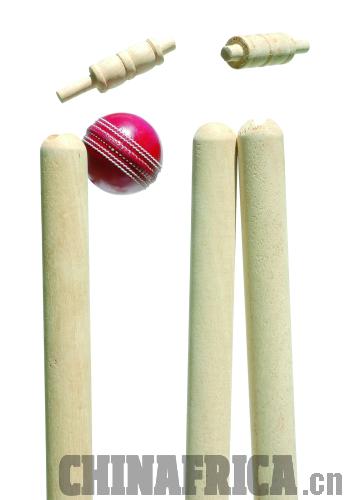| 
The 2011 Cricket World Cup came to a rapturous end in April with India claiming the sport's top prize. Africa's participation in the tournament had long been dead in the water: South Africa, Zimbabwe and Kenya failed to make an impression past the quarterfinals, with the perennially underachieving Proteas (South Africa's team name) imploding at their critical match, losing to lowly New Zealand. The loss snuffed out the last hope for African glory at cricket's showpiece event.
Cricket originated in England, much like a lot of other popular ball sports played around the world, such as football and rugby. In Africa, Anglophone countries are the traditional powerhouses of the sport. Over its long, distinguished history, the game has held onto its reputation of being complicated to understand. A cricket match consists of two teams, each with 11 players, taking turns fielding and batting. Two players bat at once, while the opposition's 11 players field and bowl. The first team on the field bowls to the batting team, aiming to keep that team's runs as low as possible. Later, when batting, they attempt to surpass the opposition's score to win the match.
Some argue that cricket is boring, citing the fact that Test matches, the game's longest and most important events, last five days. These often end in weather-affected draws. To address this, the International Cricket Council (ICC) introduced One Day Internationals (ODIs) in the 1970s – a shorter version of the game that is used at the World Cup. An even shorter version called Twenty20 cricket was also recently introduced to help the game further shed its boring reputation; these matches last only a few hours. But ODIs are what the World Cup is all about.
Kenya
Kenya's tournament began in ominous fashion. At their opening match, they were thrashed at the hands of New Zealand. Any chance of bettering their top World Cup performance looked remote. Having played in the competition since 1996, the Kenyans reached the semifinals in 2003. But after their loss to New Zealand in this year's opening round, and then to Sri Lanka after that, only a brave man would have backed them from that point onwards. In the end they failed to win any of their games, including a very disappointing loss against Canada, a team many expected them to beat. Since the heady days of 2003, cricket in the East African nation seems to have taken a few steps backwards.
Zimbabwe
It has been a difficult few years for cricket in Zimbabwe. In 2006, a mass exodus of senior players culminated in the team's now-ongoing self-imposed hiatus from Test cricket. Luckily, away from the pressure and rigors of Test cricket, the team's young players were allowed to gain much-needed experience playing shorter versions of the game against top nations. Coming into this year's World Cup, there was confidence within the squad that if they won their group games against weaker opponents Kenya and Canada, and snared some upsets against stronger teams, they could reach the quarterfinals. While Zimbabwe did knock over Kenya and Canada in impressive fashion, they never achieved those much-needed additional upsets. The team did play well in matches against their stronger opponents, though. This may bode well when Zimbabwe returns to Test cricket later this year.
South Africa
South Africa came into the World Cup favored to win. The team boasts three top 10 ODI bowlers and the top two ranked ODI batsmen (Hashim Amla and AB de Villiers). Ever since the team's post-apartheid readmission to the sport's international arena, the only question that has remained is whether they can deliver on their potential.
The Proteas sauntered into the 2011 tournament with the swagger of would-be champions, defeating the West Indies and then the Dutch with relative ease. However they quickly reverted to type in a disastrous loss to England: an all-too-familiar batting collapse saw four of South Africa's batsmen removed from the game in quick succession.
They failed to recover and lost the match by six runs. They rebounded strongly in their next match to beat the eventual winners, the Indians, and then made quick work of the Irish and the Bangladeshis to set up a quarterfinal against New Zealand. South Africa was at a comfortable advantage in this game when the unbelievable happened again and they lost four batsmen cheaply. The Proteas eventually lost the match by 49 runs, bringing an end to Africa's World Cup challenge.
|